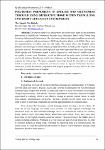Item Infomation
Full metadata record
| DC Field | Value | Language |
|---|---|---|
| dc.contributor.author | Ths. Nguyễn Vân Khánh | - |
| dc.date.accessioned | 2022-06-02T07:49:57Z | - |
| dc.date.available | 2022-06-02T07:49:57Z | - |
| dc.date.issued | 2014 | - |
| dc.identifier.uri | https://thuvienso.thanglong.edu.vn/handle/TLU/3841 | - |
| dc.description.abstract | The present study is a comparative and exploratory study of the politeness phenomena in English and Vietnamese through using Imperative Mood within Thang Long University Educational Environment. The data were collected through a modified version of a discourse completion task questionnaire (DCT) developed by Beebe et al (1990). There were two questionnaires to collect data for this study. The results show that English native speakers use Interrogative mood instead of Imperative Mood to make polite requests in most situations whereas Vietnamese native speakers use both Imperative Mood and Interrogative Mood equally and Vietnamese people consider Imperatives with internal modification are very polite in some cases. Moreover, social variables such as social status (relative power) and social distance (familiarity) tend to have influence on the language use to make polite requests for both groups. Therefore, pragmatic knowledge should be attended to in greater detail in textbooks and in classroom activities in order to improve Vietnamese learners’ awareness of both Vietnamese pragmatics and English pragmatics if they wish to be more successful in communication in English. | vi_VN |
| dc.language.iso | en | vi_VN |
| dc.publisher | TLU | vi_VN |
| dc.subject | Thức mệnh lệnh | Nghi vấn | lịch sự | yêu cầu | ngữ dụng | vi_VN |
| dc.title | Politeness phenomena in English and Vietnamese through using imperative mood within Thang Long University education environment | vi_VN |
| Appears in Collections | Kỷ yếu khoa học | |
Files in This Item:



